In 2013, the Third Plenary Session of the 18th Central Committee of the CPC proposed “actively developing the mixed-ownership economy”, which opened a new round of mixed-ownership reform. It includes both the “forward mixed reform” in which private capital invests in state-owned enterprises, and the “reverse mixed reform” in which state-owned capital invests in private enterprises. The “Guiding Opinions of the Central Committee of the CPC and the State Council on Deepening the Reform of State-owned Enterprises” issued in 2015 successively proposed “encouraging state-owned capital to invest in non-state-owned enterprises in various ways”, further emphasizing the importance of a mixed-ownership structure with private enterprises as the main body. With the continuous deepening of mixed-ownership reform, state-owned shareholders have gradually become an important part of the ownership structure of private enterprises. However, existing studies mainly focus on the impact of the mixed-ownership reform of state-owned enterprises, and the relevant research on the mixed-ownership reform of private enterprises is relatively weak and rarely involves the tax behavior of private enterprises.
Based on the perspective of “reverse mixed reform” of private enterprises participating in the mixed-ownership reform, and taking A-share private listed companies from 2013 to 2020 as the sample, this paper discusses the impact of state-owned equity participation on the tax avoidance of private enterprises. It is found that state-owned equity participation can significantly reduce the degree of the tax avoidance of private enterprises, and this effect is more obvious in private enterprises with high state-owned equity participation and state-owned equity participation with local attributes. The mechanism test shows that state-owned equity participation can restrain the tax avoidance behavior of private enterprises by alleviating financing constraints, reducing agency costs and enhancing the sense of social responsibility. In addition, in areas with low tax collection and management intensity, state-owned equity participation has played a greater role in restraining private enterprises from tax avoidance, indicating that state-owned equity participation can exert a supplementary effect on insufficient tax collection and management.
The contributions of this paper are as follows: First, from the perspective of “reverse mixed reform”, it enriches the relevant research on the influencing factors of tax avoidance, expands the theoretical explanation of tax avoidance governance mechanism, and provides a theoretical basis for governments to participate in the effective governance of tax avoidance. Second, from the perspective of tax avoidance, it supplements the research on the economic consequences of the mixed-ownership reform of private enterprises, and also provides theoretical support for the effective distribution of state-owned capital. Third, it analyzes the internal mechanism and applicable situation of state-owned equity participation affecting the tax avoidance of private enterprises, which helps to deepen the understanding of state-owned equity participation and its impact and the internal motivation of the tax avoidance of private enterprises, and provides empirical evidence for the healthy development of private enterprises and the formulation of differentiated mixed-ownership reform policies by governments.





 7265
7265  9262
9262

